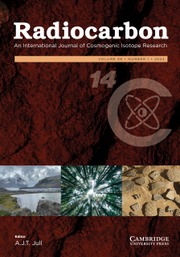Crossref Citations
This article has been cited by the following publications. This list is generated based on data provided by Crossref.
Punning, J.-M.
and
Koff, Tiiu
1997.
Application of 14C Data for the Estimation of Sphagnum Peat Increment in Estonian Ombrotrophic Mires.
Radiocarbon,
Vol. 40,
Issue. 2,
p.
833.
Punning, J.-M.
Toff, T.
Tann, R.
and
Lukki, T.
1997.
The Sensitivity and Adaptation of Ecosystems to the Disturbances: A Case Study in Northeastern Estonia.
Mitigation and Adaptation Strategies for Global Change,
Vol. 2,
Issue. 1,
p.
1.
Punning, J. -M.
Toff, T.
Tann, R.
and
Lukki, T.
1997.
The sensitivity and adaptation of ecosystems to the disturbances: A case study in northeastern estonia.
Mitigation and Adaptation Strategies for Global Change,
Vol. 2,
Issue. 1,
p.
1.
Koff, T
Punning, J.-M
and
Yli-Halla, M
1998.
Human impact on a paludified landscape in northern Estonia.
Landscape and Urban Planning,
Vol. 41,
Issue. 3-4,
p.
263.
Karofeld, Edgar
1998.
The dynamics of the formation and development of hollows in raised bogs in Estonia.
The Holocene,
Vol. 8,
Issue. 6,
p.
697.
Kilian, M.R.
van Geel, B.
and
van der Plicht, J.
2000.
14C AMS wiggle matching of raised bog deposits and models of peat accumulation.
Quaternary Science Reviews,
Vol. 19,
Issue. 10,
p.
1011.
Turetsky, Merritt R.
Manning, Sturt W.
and
Wieder, R. Kelman
2004.
Dating recent peat deposits.
Wetlands,
Vol. 24,
Issue. 2,
p.
324.

